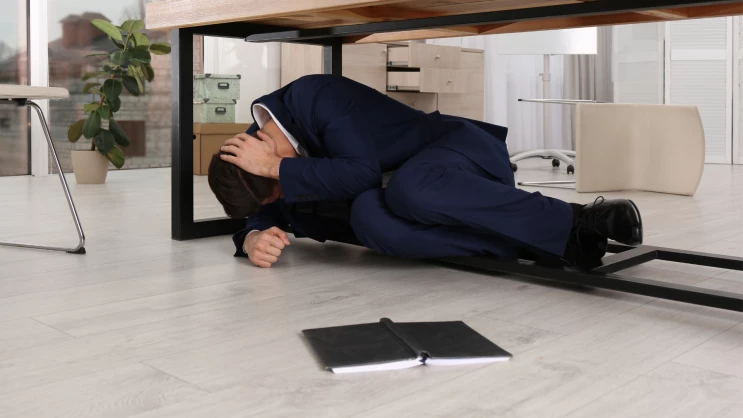Instruction on precautions and rules of conduct during an earthquake from the Civil Protection Organization
Instructions from the Civil Defense Organization on precautionary measures to be taken by the population during and after an earthquake in our country.
1. Before an earthquake. How to prepare in advance:
- Place everyday objects inside the building to be protected from non-structural damage, i.e., damage caused not by the building, but by objects;
- Furniture and office equipment placed on shelves should be secured with plastic retaining materials or adhesive to prevent them from sliding and falling.
- Stoves and other heating devices should be attached to the wall or floor with sturdy materials.
- Cupboards and similar items that can tip over should be attached to the wall. If there is a gap between the secured object and the wall, filler should be placed between them to reduce the impact effect.
- Ceiling and wall chandeliers, air conditioners, etc. should be suspended on hooks at a sufficient distance from walls and windows to bear their weight.
- Cabinet doors containing heavy objects should be tightly closed with mechanical locks.
- Poisonous, explosive, and flammable substances should be secured in such a position as not to fall and stored so as not to break. These substances should be marked with phosphorescent, identifying labels.
- Gas valves and electrical fuses should be automated against gas leakage and fire.
- Hazards on roads that can be used to urgently exit the building must be eliminated, these roads must be marked, and objects that can hinder exit from the road must be removed.
- You need to create wide exit paths. You should use doors that open outwards, emergency exit doors should not be locked. Emergency exits must be illuminated.
- Children's cots should not be placed near windows and heavy cabinets that can tip over, there should be no shelves with heavy objects on the cot.
- A 'Disaster Preparedness Plan' should be drawn up with the participation of all people (at home, at work, in an apartment, at school), and this plan should be reviewed every six months. Drills should be regularly held following this plan.
- In case of a natural disaster and emergency, it should be determined how to ensure communication with family members, alternative meeting places and a contact person located outside the district (inside, outside the home, workplace, school, or neighborhood).
- You should prepare and store copies of important documents (identity cards, property rights certificates, insurance documents, medical certificates, diplomas, passports, bank books, etc.) in a waterproof place, and also have copies of these documents with a contact person located outside the district.
- You need to have a fire extinguisher, suitable for the characteristics and size of the dwelling or workplace, predetermined by the building management, and carry out its periodic maintenance. The device should be stored in an easily accessible place. Everyone should know its location. It should be securely attached to the wall. The fire extinguisher should be serviced by the relevant company every year. They should be refilled after one-time use.
- A sign saying "Do not use during an earthquake" should be hung on the elevator doors in buildings.
2. During an earthquake:
- Do not panic.
- Avoid unsecured cabinets, shelves, windows, etc.
- If possible, form a rescue triangle by squatting under a table leaning on sturdy chairs, or next to objects that can provide protection, such as a full and bulky chair, couch, full chest.
- Protect your head by taking it between two hands or using a protective material (pillow, book, etc.). Wait in this position until the shaking stops.
- Find a safe place, get on your knees, curl up to protect your head and neck, and hold onto a stationary place to avoid falling.
- Don't run to the stairs or exits, don't climb onto balconies, don't jump down from balconies or windows.
- Under no circumstances use elevators.
- Do not use phones except to report emergencies and fires.
- Do not light matches, lighters, or touch electrical switches.
- If you are in a wheelchair, the wheels should be locked, and the head and neck should be protected.
- In places where there are working tools, such as kitchens, workshops, and laboratories; stoves, ovens, and similar devices should be turned off, and materials and substances that can spill should be removed.
- Close electrical, gas, and water valves extinguish stoves and heaters.
- Take other safety measures if still possible, take necessary items and materials, and immediately leave the building along a predetermined route and head to the gathering place.
- If you are in a classroom or office at school, protect the head and neck by forming a life triangle under or next to a solid desk or table; if in the hallway, protect the head and neck by forming a life triangle next to the wall.
- Stay away from windows and glass objects.
- If you are in the open during an earthquake: Stay away from power lines and poles, trees, other buildings, and the bottom of walls. Be ready for danger from the environment, squatting in the open.
- Do not be under slopes where landslides can occur and rocks or rocks can fall. If you find yourself in such a situation, you should quickly move to a safe place.
- Take precautions against pipes, broken glass, and plaster, which can fall from buildings.
- Be aware of dangers from underground sewer, electric, and gas lines.
- Stay away from the seashore.
- If you are driving during an earthquake:
- If you are driving on the highway during a thrust and if your location is safe, you should pull over to the left and stop, not blocking the road. Leave the ignition key in place and wait inside the car with the windows closed. After the jolts stop, go out into the open.
- If the car is not in a residential area or a safe place (near trees, power lines, or poles, on a bridge, etc.); it should be stopped, leave the ignition key in place, and go out to open areas away from traffic.
- If you are in a tunnel during a thrust and are not close to the exit; the car should be stopped, get down and lie on its side, pull your legs up to your stomach, and protect your head and neck with your hands.
- If you are in a closed parking lot: get out of the car, lie on your side, and protect your head and neck with your hands. Large masses, such as ceilings and tunnels, which can fall from above, can crush the car, but not destroy it. If you are inside the car, a piece that has fallen on the car can crush you.

3. After the earthquake:
If you are in a closed area:
- First, make sure you are safe.
- Then check if there is anyone around you who you can help.
- Fires after earthquakes are very common secondary disasters. Therefore, if you smell gas, close the gas valve. Open windows and doors. Leave the building immediately.
- Clear up spilled hazardous materials.
- Put the removed phone handset on the phone.
- Take your emergency kit with you and move to the gathering place in your area.
- Listen to warnings through mass media such as radio and television.
- The streets should be empty for emergency service vehicles.
After every strong earthquake, aftershocks always occur. Over time, aftershocks become less frequent and decrease in strength. Aftershocks can damage already damaged buildings. For this reason, you should not enter damaged buildings until the tremors have completely subsided. During aftershocks, you should do what is necessary to do during the main earthquake.
If you are in an open area:
- Pay attention to the damage around you and mark it.
- Stay away from damaged buildings and power lines.
- First, help those who need emergency assistance in your immediate vicinity.
- Then head to the gathering place in your area.
- Participate in assistance activities. Help the victims of natural disasters who need special attention - elderly people, infants, pregnant women, disabled people.
If you are trapped under the rubble:
- Check your situation without panicking.
- If your mobility is limited, do not risk your life in an attempt to get out. Know that rescue teams will try to reach you as soon as possible.
- Keep your movements under control to use energy as efficiently as possible.
- If you can use your hands and feet, try to announce your presence by hitting pipes, radiators, gas installations, and the floor.
- If you can use your voice, try to hear the voices of rescuers and call them out. However, use your energy in a controlled manner.
Gathering points for residents during an emergency:
It is important that citizens call the ALO 101 civil defense emergency line to get the necessary assistance in case of possible disasters and emergencies in our country, take into account the announcements, information, and warnings of the authorities, and follow the frequencies of Kuzeyin Sesi Radyo Vatan (87.5 - 104.3), Radyo Vatan Nihavent (89.8-100.4) and Radyo Vatan Türkü (94.4-100.5), which will work as "Radio for Emergency Situations" in such cases.


